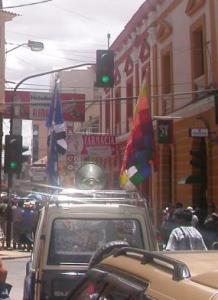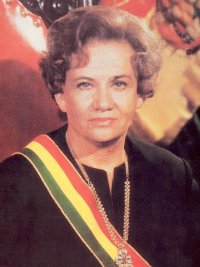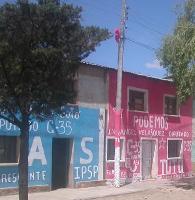|
Bolivia Facts: Bolivia Political Trivia The term trivia, by dictionary definition, is widely used to refer to tidbits of unimportant (or trivial) information, but it can also refer to basic or elementary knowledge. I just thought it would be fun to share these “tidbits”! (Hey, some of them are pretty serious!)
VOTING AGE In Bolivia the voting age is 18 for people who are married and 21 for singles. Do you know of any other country where suffrage depends on marital status? A little weird piece of political trivia. LOGOS Each political party typically has its own logo or symbol in colors that clearly identify and differentiate it from other parties. This is especially important and helpful in a country where many voters cannot read or write. These symbols are printed in color on all voting ballots to ensure the voting rights of the illiterate. Not a politically trivial matter! 
SLOGANS Each party will usually also have its own slogan or song. Vehicles painted with the political party’s colors and equipped with stereos and loudspeakers are often driven around neighborhoods throughout the entire city playing the party’s “anthem” and loudly repeating the party’s slogan and information on its platform. At other times the candidates will board large vehicles (usually large cargo trucks) along with dozens of their supporters, dressed in T-shirts of the party’s colors and waving flags. They throw gifts out to the public (toys, t-shirts, caps and other souvenirs - things that are trivial to some, but which many people can't afford). It really can get to be quite loud and rather annoying when these vehicles pass by homes and offices day after day. However, it is an effective way to reach the public in marginalized areas.
CONTACT On certain days political candidates will set up an area in poorer neighborhoods (such as in a park or plaza) with a barbecue, sodas, and live or recorded music and other entertainment and will remain there for a full day. Adults and children alike enjoy a good meal and a day of fun and are often given gifts such as t-shirts, caps and other souvenirs (with the party’s logo of course) at these events. The candidates use this time to interact on a more personal level with the public and inform them on their political campaign issues and promises. (Among those who can’t afford to buy clothing, gifts like these can go a long way in obtaining a vote...hmmm...) RECRUITMENT Often students and children are recruited to stand at the intersections of busy streets and avenues. When cars come to a standstill for a stoplight, they run up and down the rows of cars slapping stickers (with a party’s logo) on car windows and exteriors. Needless to say, they do not bother to request permission to do this and some drivers are very annoyed, especially if they support a different political party. It isn’t all that safe for the kids either. ELECTION DAY Did you know that in Bolivia elections always take place on a Sunday? Because elections are compulsory, citizens vote on Sundays, the only day that is not a work day in Bolivia. So no excuses! PROHIBITION Did you also know that the government prohibits the sale of alcohol anywhere, even in restaurants, 24 hours prior to election day and on election day itself? With so many parties to choose from, it really is best to place your vote with a clear head, isn’t it? NO TRANSPORTATION On election day, there is no public transportation available and no private vehicles are allowed to circulate without a special permit from the Electoral Court. This means that everyone must WALK to the nearest voting station, no matter how far away it is. CIRCULATION By law, people may not circulate on the streets in groups of more than two on election day. OBLIGATION Bolivians (and foreigners who vote in Bolivian elections) must carry a document to prove that they voted in national elections. For a period of time after elections are over, public institutions, and some private institutions such as banks, are obligated to request this form of ID when a person applies for a document (such as a birth certificate or driver’s license) or when withdrawing funds from their bank account. Without this ID, the institution may not allow the transaction! Nothing trivial about this! 
FIRST WOMAN PRESIDENT Here's another little interesting piece of political trivia: in Bolivia a woman has already held the position of President. Lidia Gueiler Tejada was interim President of the Republic between 16 November 1979 and 17 July 1980, when she was deposed in a military coup by Luis García Mesa (who is currently imprisoned in La Paz without parole until 2025). She went into exile at that time and, upon returning to Bolivia, went on to become Ambassador of Bolivia to Colombia and Venezuela. She retired from politics in 1993, and died in 2011. Photo: Ministry of the Presidency of Bolivia. You can see their gallery of portraits of every president Bolivia has had (in Spanish) at their "Salon Museo" at this URL: www.presidencia.gob.bo/     |
